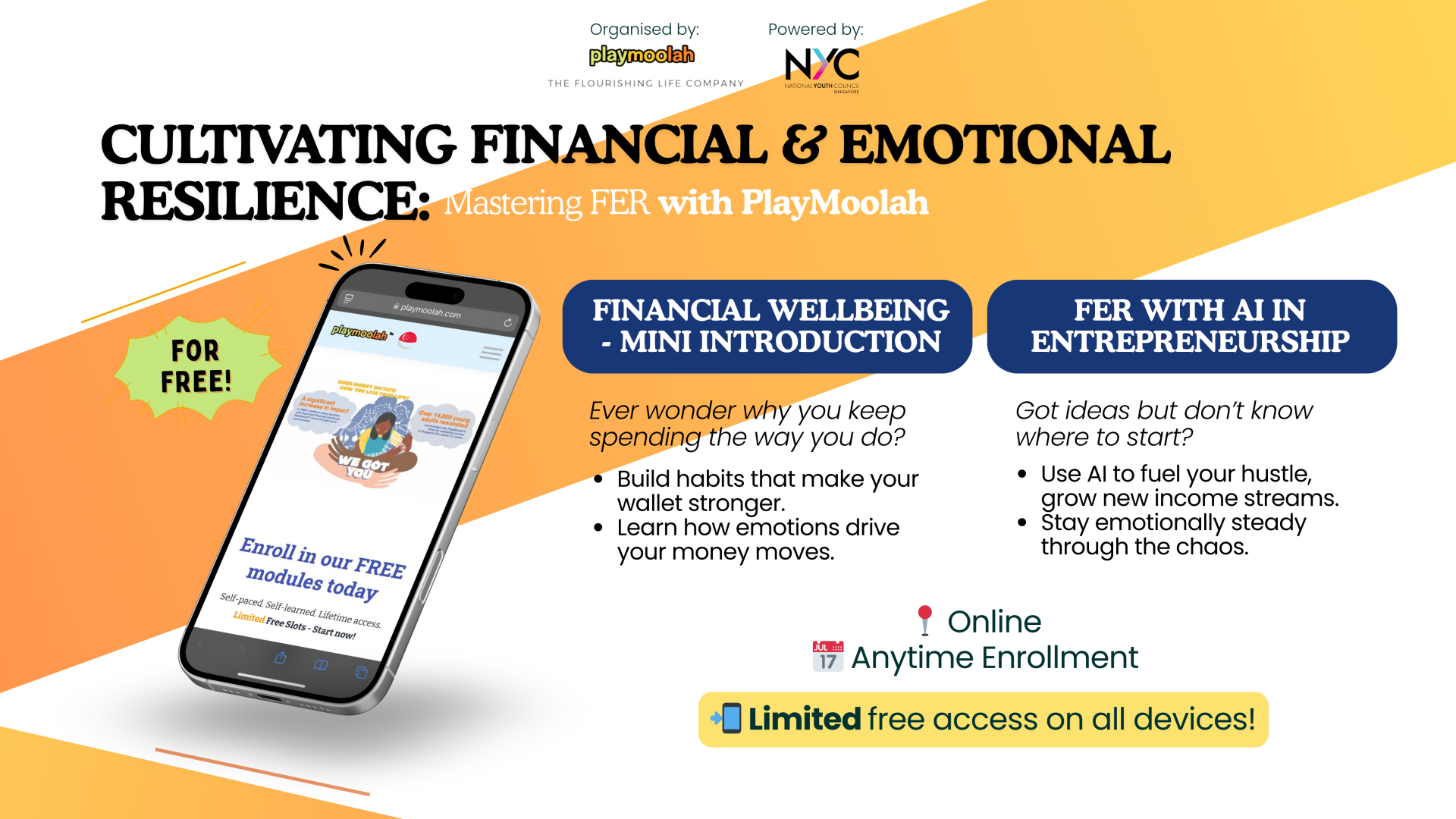One might think that mindfulness and money are of separate spheres – with the former being noble and perhaps even encompassing a spiritual aspect, while the latter is something associated with dread, survival and a mercenary attitude. However last Tuesday, PlayMoolah facilitated a panel discussion that revealed how mindfulness and money are in fact two sides of the same social coin.
Imagine then, a world where the pursuit of money that shackles you to the paycheck at the end of the month is replaced with the pursuit of meaning that liberates and empowers you to make meaning out of money, leveraging on it as a tool to further your own aspirations and larger purposes. The panel discussion concluded that mindful money and consumption, when steered in the right direction, can serve a greater purpose – for all to co-create a flourishing and equitable world that is more inclusive and habitable for ideas to brew, people to grow and communities to develop and live well.
The event was organized in partnership with the National Youth Council, at the Future of Us Exhibition Marketplace. The panel consisted of Kia Jie Hui, who works at the Forum for the Future Singapore, and three entrepreneurs: Lance Ng of business enterprise Gift and Take (GAT), Prasoon Kumar of international non-profit organization Billion Bricks and Tay Lai Hock of non-profit organization Ground Up Initiative (GUI). Audrey Tan, co-founder of PlayMoolah, was the moderator of the discussion.
The discussion began with Lai Hock bursting into the catchy song “Money Money Money” by Abba, a fitting critique for the increasingly consumerist culture we find ourselves entrenched in, both past (in the 80s) and present. The world might be pitted on uneven odds, with the scales tilting in favour of the wealthy, but we are not altogether powerless in shaping our own lives and futures. We can opt out of a coercive system of consumerism by living out the simple creed set by Mother Theresa, “live simply so others can simply live”, as Lai Hock quoted. However, when we are swamped with an influx of new products in the marketplace on a daily basis, and when our all too insatiable human greed feeds our kiasu Singaporean mentality of keeping up with the Joneses, how do we then live up to this simple creed but difficult deed?
This dawning realization becomes all the more pertinent when we realize how interconnected we all are as people. We often share complex and even symbiotic relationships with people, rich and poor, consumer and producer, and Lance calls for a bridging of the gap between the spiritually poor in the marketplace and the materially poor in the world. Perhaps instead of unthinking philanthropy or hawk-clawed acquisitiveness, we can start to think about how we can give meaningfully and helpfully, without the niggling voice that calculates the gains and losses, and puts a value on the unquantifiable richness, depth and complexity of human relationships which are in themselves a resource teeming with potential.
The panelists discussed how do we go from mindless to mindful consumption. Prasoon rightly notes that businesses leverage on revealing and exploiting consumer insecurity to compel more and more consumption. Mindless consumption thus renders us slaves to a capitalist system, as we allow ourselves to be mastered by money instead of mastering and being stewards of our own money. Jiehui offered the perspective that telling a story powerfully can change people, and their approach to money. To be able to craft one’s own personal narrative to challenge the dominant consumerist narratives imposed by large businesses is in itself a laudable start towards mindful consumption. Lance and Lai Hock emphasized on authenticity, starting from the inside out. They believe that to be a conscious and mindful consumer one must first discern and live out their own truths, blazing the trail for others to follow suit. Mindful consumption thus begins with acute self-awareness and courage to go against the grain and carve out purposeful paths towards financial empowerment.
We can begin to practice mindful consumption by living simply. The panelists once more shared the small steps they have taken as they embarked on this lesser travelled path. Jiehui believes that “food and thinking about what we eat is one of the easiest ways to start”, after all, food is a universal unifier that brings people from diverse walks of life together. Lai Hock advocates the practice of giving something to one’s neighbor. He wisely said that giving need not be on a large, public scale as that of the Singapore Kindness Movement, and it does not matter how people perceive you, nor what you give, for the act of giving is, in itself, sufficient reward. He shared how he has been giving homegrown vegetables to his neighbors, which they receive with much gratitude, and even reciprocate in kind. The joy of giving stems from simple kindness, and its fruits are sweet to savour and far-reaching. For Lance, he lives simply by receiving more fully what life has to offer. Speaking about his switch from his high-paying corporate job to his current career and lifestyle, Lance said, “I have never been happier with less”. Perhaps we can too dispel the relentless modern day pursuit of ‘more and more’ and instead start to embrace the philosophy that less is indeed more.
We are building the futures we envision everyday, by searching inward to grow outward and build upward, towards goals and purposes larger than ourselves. The Future of Us exhibition not only charts the trajectory of the milestones we have accomplished thus far, as a nation of dreamers and doers, but also offers us a glimpse of the future that is ripe with an endless medley of possibilities. As we navigate our way towards a more flourishing and equitable world, let mindful money and meaning-making be our anchor and guide to steer us, upward and on.

